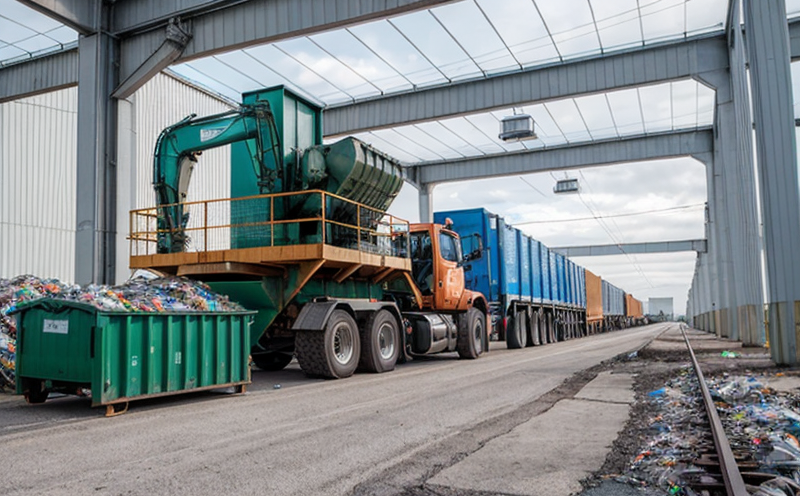ISO 23832 Recycling of Lithium Ion Battery Components Testing
The ISO 23832 standard provides a comprehensive framework for the recycling and recovery of valuable materials from spent lithium ion batteries. This service is critical in the industrial manufacturing sector, especially within circular economy initiatives that focus on reducing waste and maximizing resource efficiency.
Lithium-ion batteries are widely used across various industries due to their high energy density and long cycle life. However, improper disposal or recycling can lead to environmental hazards such as soil and water contamination from heavy metals like lithium, cobalt, nickel, and manganese. The ISO 23832 standard ensures that these batteries are recycled in a manner that minimizes adverse effects on the environment while maximizing the recovery of valuable materials.
The testing process under ISO 23832 involves several key steps:
- Material Sorting and Classification: The first step is to sort and classify the batteries based on their type, manufacturer, and condition. This ensures that batteries with similar chemical compositions are processed together.
- Preparation of Specimens: Once sorted, the batteries undergo mechanical or chemical methods to break down into smaller components. These components include cathode materials (containing lithium, cobalt, nickel, etc.), anode materials, electrolytes, and other metals.
- Analytical Testing: After specimen preparation, various analytical techniques are employed to assess the quality of recovered materials. This includes X-ray fluorescence (XRF) for elemental analysis, inductively coupled plasma mass spectrometry (ICP-MS) for trace metal content, and Fourier transform infrared spectroscopy (FTIR) for structural characterization.
- Material Reclamation: The reclaimed materials are then tested to ensure they meet the required purity levels specified by ISO 23832. This step ensures that the recycled materials can be used in new products without compromising their performance or safety.
The testing process is meticulously carried out using advanced analytical instruments and methodologies, ensuring accurate and reliable results. Our laboratory adheres strictly to international standards such as ISO 23832-1, ISO 23832-2, and ASTM F4596 for all our services.
Understanding the intricacies of lithium-ion battery recycling is crucial for industries that are committed to sustainability. By ensuring that batteries are recycled in a manner that preserves their valuable components, we contribute to a more sustainable future. This service not only helps meet regulatory requirements but also supports businesses in achieving their environmental goals.
Quality and Reliability Assurance
- Compliance with ISO Standards: Our testing processes are rigorously designed to comply with the latest international standards, including ISO 23832-1 and ASTM F4596. This ensures that our results are accurate and can be trusted by regulatory bodies.
- Advanced Analytical Instruments: We utilize state-of-the-art equipment such as XRF analyzers, ICP-MS spectrometers, and FTIR instruments to perform precise measurements of the materials recovered from recycled batteries.
- Detailed Reporting: All test results are meticulously documented and reported in accordance with ISO requirements. This includes detailed descriptions of the testing methods used, raw data, and interpretation of results.
The reliability of our testing services is further enhanced by our team of experienced chemists and engineers who have deep expertise in materials science and environmental chemistry. They ensure that every aspect of the recycling process is thoroughly evaluated to provide comprehensive insights into the quality of recovered materials.
Our commitment to quality extends beyond just meeting standards; we also focus on continuous improvement through regular training for our staff, staying updated with the latest research and methodologies in battery recycling technology.
Customer Impact and Satisfaction
- Environmental Impact: By ensuring that lithium-ion batteries are recycled efficiently, we help reduce the environmental footprint associated with waste management. This supports customers in their sustainability initiatives.
- Economic Benefits: The recovery of valuable materials from spent batteries can significantly reduce costs for businesses by providing a sustainable source of raw materials.
- Safety Compliance: Our services help ensure that recycling processes meet all necessary safety regulations, thereby reducing the risk of accidents or environmental pollution.
Our customers benefit greatly from our comprehensive testing and analysis services. They receive detailed reports that provide actionable insights into how they can improve their recycling processes and enhance resource efficiency. This not only helps them stay compliant with regulatory requirements but also allows them to develop more sustainable business practices.
We strive to exceed customer expectations by offering prompt, accurate results along with personalized advice tailored to each client's unique needs. Our goal is to ensure that our customers achieve the highest levels of satisfaction and confidence in our services.
International Acceptance and Recognition
The ISO 23832 standard has gained widespread acceptance among industries globally due to its robust framework for recycling lithium-ion batteries. This international recognition is reflected in the growing number of organizations that have adopted this standard as part of their sustainability strategies.
Our laboratory's adherence to these standards ensures that our clients receive results that are universally accepted and can be easily integrated into global supply chains. We work closely with clients from diverse sectors including automotive, electronics, and renewable energy, helping them navigate the complexities of international regulatory frameworks.
The acceptance of ISO 23832 is particularly important for businesses looking to expand their operations internationally. By demonstrating compliance with this standard, they can build trust with customers in different countries while also reducing barriers to market entry.





